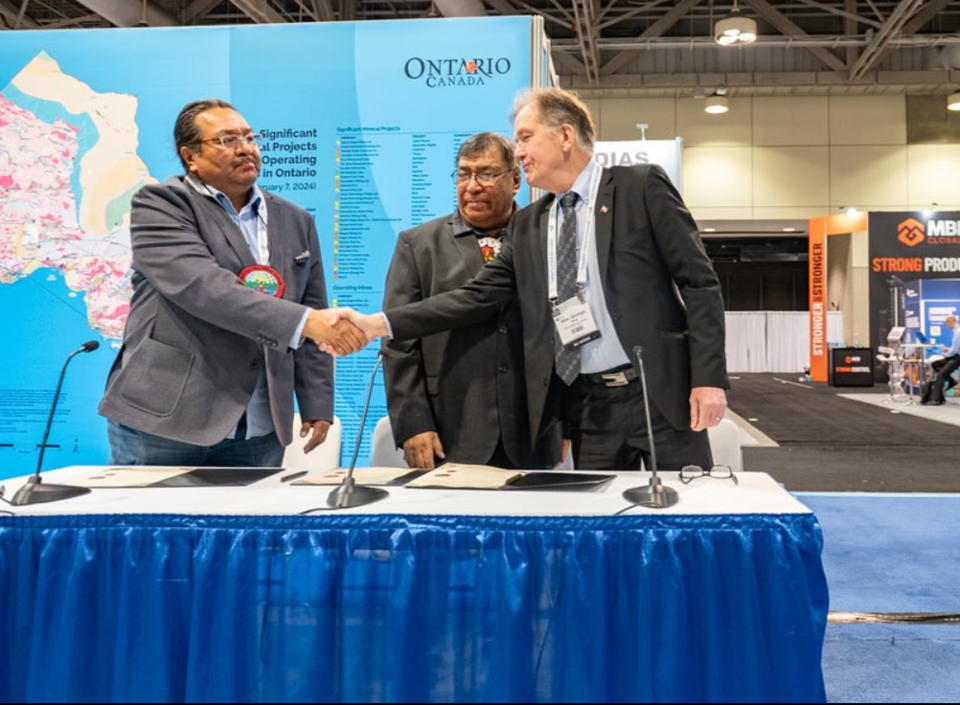Doug Ford’s full-speed-ahead approach to build a Ring of Fire road and mine more critical minerals compelled a council of northwestern Ontario chiefs to tap the brakes on the premier’s enthusiasm.
The Matawa Chiefs Council outlined their stance in a news release this week that more relationship-building with Indigenous communities needs to be done before any industrial development takes place in the James Bay mineral belt.
Marten Falls Chief Bruce Achneepineskum said while his community stands to reap the rewards from mining-related development in the Far North, other outlying communities feel they could be left out in the cold.
“That’s where the chiefs are coming from,” said Achneepineskum. The chiefs are asking for a meeting with the premier.
Aside from one absence, the nine-member Matawa First Nation Chiefs Council approved issuing news release, even Achneepineskum.
That may seem surprising since Marten Falls is a vital development proponent with Ontario to build a north-south road to reach one of the most prospective regions in North America for critical minerals, but Achneepineskum wanted to show his solidarity.
"I do believe that there has to be a process for our neighbouring First Nations to also join in the discussions. And it has to have that good will, that honesty, that meaningfulness from the government."
Marten Falls is currently in negotiations with the province to reach a final agreement on a community access road and in how resource development will unfold.
In promoting his Fortress Am-Can strategy this week, Ford remained eager to see Ring of Fire road construction started and mines fast-tracked into production to boost trade with the U.S. with the threat of American import tariffs on all Canadian goods looming next week.
Ford noted Indigenous communities in the Aroland-Greenstone area, at the southern end of where a Ring of Fire road would terminate, were ‘gung-ho’ about development.
But Achneepineskum said Matawa’s message to Ford was that there remains some unfinished business.
“It’s to raise awareness, because we don’t want to be left out of the equation when talking about resource development on our (traditional) lands.”
He said too many First Nation communities in Canada are “underprivileged, under-resourced (and) bordering on Third World conditions. We want to see that change.
“We should have a better relationship, one that’s built on transparency, openness and there should be a protocol.”
Achneepineskum said Marten Falls will be directly impacted by mine development; that’s not to say other communities won’t also feel the effects.
Other communities, he said, want the same relationship with Ontario, especially with a mining project of this scale with such wide-ranging economic and social impacts.
The manner in which Ontario decides which First Nation communities need to be consulted on resource development has been called into question numerous times by the communities.
Many have territorial land claims extending several hundred kilometres out from their communities or have environmental concerns about the downstream impact of industry on water quality and the impact on the land and their well-being.
Achneepineskum finds, too often, First Nations have to resort to litigation, instead of being included in those discussions, just to ensure that their rights are respected and recognized by government.
The Matawa chiefs also emphasized this week that they want to “formally establish a working relationship” with Ontario to lay the groundwork for future northern development.
The Ford government dismantled the previous government’s Regional Framework table for the Ring of Fire in 2018 in an effort to “refresh” the consultation process.
But no new negotiating vehicle or approach has been introduced other than maintaining ongoing discussions with the communities in the Ring of Fire corridor, namely Marten Falls, Webequie and, hopefully, Aroland First Nation by spring.
“Unfortunately, the Regional Framework took too long to arrive at any negotiated agreement. We’re looking for something that we can move ahead on together,” Achneepineskum said.
On what needs to happen to advance development in the Ring of Fire, Achneepineskum said government has to reform its policies for consultation and in how it communicates with First Nations.
“I think it has to go a little bit more than that, especially when talking about large projects like the Ring of Fire that will change the landscape, change Northern Ontario, our communities’ economies and regional economies.”
On First Nations’ dealings with the Crown, Achneepineskum said Ontario is only one half of that relationship.
He wants Ottawa to step up and get involved in these negotiations on matters of natural resource extraction, use of the land, and the sharing of resources as laid out in the treaties.
“I don’t see that happening.
“It should really be a tri-partite process,” he said. “That’s the way to go.”
Ottawa has little to show given the plodding process involved in the federal government’s almost five-year-old Regional Assessment socio-economic process.
“Well, yeah, that’s politics for you,” chuckled Achneepineskum.
With large initiatives like the Ring of Fire, the federal government has their policies based on their party leanings that determine what they do, he said.




